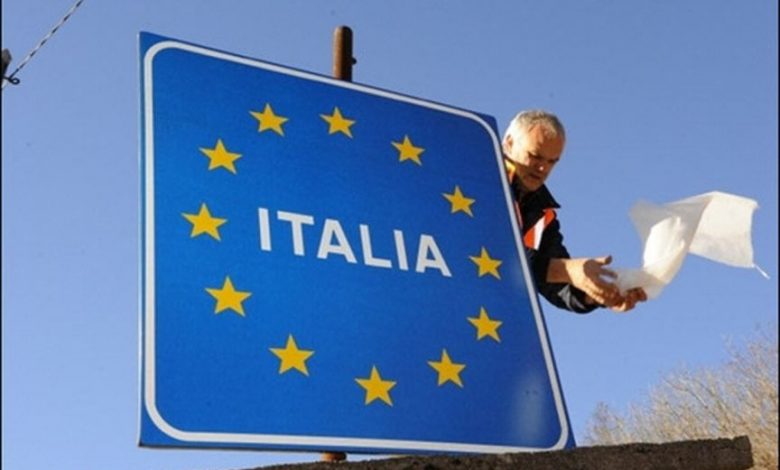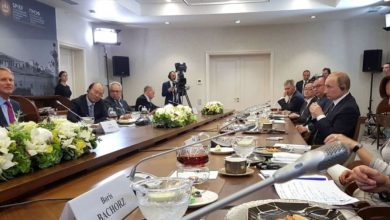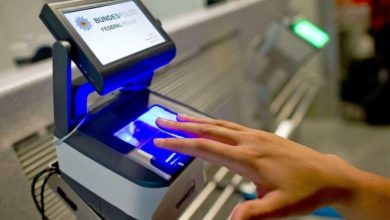Schengen space has become wider
Barriers fall, barbed wire is removed, checkpoints are eliminated – the European Union is solemnly celebrating the expansion of the Schengen area. On the night of Thursday to Friday, another 8 countries entered it.
Now, 400 million Europeans will be able to freely move through a vast space from Lisbon to Tallinn, without being obliged to undergo customs and passport control. It is really necessary to have an identity card or passport with you – the police may, if necessary, require them. However, the movement of people and goods is greatly facilitated.
Jose Prime Minister Jose Socrates, the Prime Minister of the European Union, concludes that opening borders is very important for Europe, as its ideal has always been connected with freedom and security.
Celebrations and celebrations took place in border cities on both sides of the already symbolic border between the countries of the former socialist camp and their western neighbors. Now this border is opening, and the Eastern European countries associate their hopes for a breakthrough in the development of the economy with the opening of the borders.
Schengen expansion: for whom joy, for whom visa fee increase
After the night festivities of the inhabitants of the border regions, the leaders celebrated the Schengen expansion. Not far from the German town of Zittau, the borders of the Czech Republic, Poland and Germany converge the leaders of these countries and European leaders. Says German Chancellor Angela Merkel:
“It is a great joy for me that the younger generation is gaining the experience of European unity, which the fathers and grandfathers of some of them could only dream of. These borders brought a lot of grief.”
The city of Frankfurt an der Oder once became one of the symbols of the post-war device of Europe. It was long impossible to imagine him without a border checkpoint. But, nevertheless, such a day has come and this is welcome in Frankfurt and the Polish Slubice on the other side:
“It’s great. I am studying in Frankfurt, but I live in a student dormitory in Poland,” says a German student, “now a lot will be easier. It was absolutely no pleasure when I stood and waited ten minutes for a special train. Now you can walk, it’s great . “
The Mayor of Slubice will share the joy of a German student. He expects good news from the union for his city:
“The fact that the border was removed is of course very important for stimulating the development of both cities. Which city would not want to trade with the neighboring one?”
But if the new and old Schengen countries now become easier to trade and communicate, the same cannot be said of the EU’s eastern neighbors.
Cross-border trade has so far played a huge role for residents of Lithuania and Belarus.
A Schengen visa for Belarusians will now cost more than a Polish or Lithuanian visa – 60 euros instead of five.
Experts predict the rise in price of cheap Belarusian goods, which they happily bought in Lithuania and Poland.
Schengen area arrived. Barriers are open
On Friday morning, the Schengen area expanded to nine countries. In particular, three Baltic states, including Lithuania, entered the Schengen zone. At midnight in Lithuania, all barriers at the checkpoints of the border with Latvia and Poland rose. From that moment on, Europeans, including Lithuanians, will be able to move freely across land and sea borders to 24 countries without personal passport control.
At the air borders – at airports – checkpoints will be abolished in March next year. By the way, this privilege – to cross the border of Schengen countries without checking documents – can be used by all residents of Lithuania, not only its citizens, that is, for example, Russian citizens living in Lithuania and having a permanent residence permit here.
Lithuanian politicians call the country’s accession to the Schengen agreement historical, somewhat comparable to joining the European Union. Schengen, they say, is a manifestation of trust in our citizens, as well as in our border guards, who are responsible for the security of the entire Schengen area.
Lithuania received 157 million euros from the European Union for the technical organization of preparing the country for a new quality. New outposts, border crossings were built, the base of aviation and internal communications of the Ministry of Internal Affairs of the country was strengthened. A lot has been spent on Lithuania joining the Schengen information system, which will help law enforcement agencies in the fight against crime. “There have been checks by EU experts. They rated our work very highly. And from January 1, another function will be to control migration processes within the country, ”says Valentinas Novikovas, deputy commander of the Lithuanian border guard service.
The inhabitants of Lithuania are happy to move freely in the Schengen countries, but this joy hardly covers the sincere frustration of those, and there are many of them who value contacts and trips to their eastern neighbors – Belarusians, Russians. They will have to pay much more now, especially, according to forecasts, Lithuanian-Belarusian relations could suffer. In order to come, for example, from Minsk to neighboring Vilnius, a Belarusian citizen will have to pay for a visa instead of the previous five 60 euros. According to some experts, Lithuania, having entered Schengen, finally shut itself off from its neighbors in the East, which local politicians have been stubbornly striving for all the last years.
Lithuanian Prime Minister Gediminas Kirkilas notes the expansion of the Schengen space in Tallinn, which brought together the heads of state and government of the EU, as well as European Commission President Jose Manuel Barroso. President of Lithuania Valdas Adamkus participates in special celebrations right on the scene. This morning, he, together with Polish President Lech Kaczynski, raises a symbolic barrier from the now former Kalwari checkpoint. And in the afternoon, President Adamkus takes part in a similar event on the Lithuanian-Latvian border with the President of Latvia.
Czech border guards will not be left without work due to the country’s entry into the Schengen zone. They will be engaged in checking documents and cargo. From today, the tourist bus can stop on the roads and ask travelers to present their passports.
The Czech police one day before the abolition of border control decided to check whether they are able to ensure the country’s security. More than six hundred law enforcement officers took to the streets, who stopped the “suspicious” citizens and demanded to present documents. During the operation “Foreigner” checked two thousand people. 150 of them did not have permission to stay in the country; they managed to catch one Romanian citizen who was on the international wanted list. In general terms, starting from December 21, this is how they will protect Czech territory. “The border service and the police service for foreigners went through changes. I had to lay off 2,300 people. However, they will not be left without work, will serve in the same regions as before and ensure the security of our territory. Only now they will take control of foreigners and transport routes. For example, four hundred people will be hired to check documents on highways and railroads, ”says Indřich Urban from the Foreign Affairs Police.
Some former Czech border guards will now work as specialists in fake documents. It is expected that from next year the number of visitors who may illegally stay in the country will increase. Tourists will also be checked.
With a Schengen visa, you can now travel freely around the Czech Republic. Previously, Russians had to apply for a separate permit to enter the country. Czechs also prepared for the arrival of guests from Western Europe – for example, in a nature reserve in the northwest. One half lies in the Czech Republic, and the second in Germany. Says Petr Soukup from the administration of the natural park: “Until recently, only five people worked in our border service. From now on, people will be able to cross the border, not only at checkpoints for pedestrians, but anywhere, so there will certainly be more tourists. Still, they sometimes have to check documents, and five people will not cope with this task. Fifteen border police officers will be joining us. ”
On the Czech border with Austria, residents of the surrounding towns gathered in the evening to watch the festive fireworks. Residents of Tesin, both on the Polish and Czech sides, plan to restart the tram, which stopped running after the appearance of the border barrier in 1920. And on the border of the Czech Republic and Slovakia, as before, documents will not need to be presented.
Poland dismantles border posts on the western border and strengthens on the eastern
57% of Poles believe that joining Schengen will benefit their country.
Residents of the vast majority of East European countries today are spared the need to stand in line at border points with countries belonging to the Schengen zone. And tourists who came, for example, from Russia to Vilnius will be able to freely travel to Lisbon, without ever having to get a passport from their pocket. Since December 21, nine more countries have joined the Schengen Agreement – Hungary, Latvia, Lithuania, Estonia, Malta, Slovenia, the Czech Republic, Slovakia and Poland.
The construction of a single European space for moving people began in 1985 in the Luxembourg city of Schengen, when Germany, France, Belgium, the Netherlands and Luxembourg signed an agreement on the gradual abolition of border control. The Schengen Convention entered into force exactly 10 years later.
The country of the Schengen area closest to the Russians is now Poland. The night before, the Polish parliament unanimously adopted a resolution on Poland’s accession to the Schengen agreement, although this was only a symbolic gesture – the relevant documents were signed a long time ago, and at the time of voting on the borders of Poland with the Czech Republic, Lithuania, Germany, border barriers and poles were dismantled in many cities.
The country has been preparing for this day for more than one year. First of all, border guards were preparing. Some border guards of the western and southern borders were transferred to the eastern border. There, on the borders with Belarus, Ukraine and Russia, 10 thousand Polish border guards are already serving. Control is being strengthened, not only at the border itself, but also in the border zone, primarily the 10-20 km zone. Special mobile patrol groups will be on duty there, who will be engaged in the fight against smugglers crossing the border illegally, as well as checking the legality of the presence of third-country nationals in Poland, and therefore the entire Schengen area. For this, special so-called “Schengen buses” will be purchased. The equipment installed in them allows you to take fingerprints and immediately enter them into the database of countries of the entire Shen Agreement.
According to a poll conducted by sociologists in Poland the day before, 57% of Poles believe that joining the agreement will benefit their country. Opponents, in turn, fear an increase in smuggling, drugs and an influx of goods that will not be checked and could be hazardous to health.
It is also noteworthy that the Polish government does not exclude that border control may return to border crossings. But we are talking about exceptional situations, for example, natural disasters or the 2012 European Football Championship, which will be held in Poland and Ukraine.
Meanwhile, if the price of a Polish, now a Schengen visa for citizens of Ukraine remains the same – 35 euros, then for citizens of Belarus, which has not signed a readmission agreement with Poland and the European Union, visas will become almost twice as expensive – 60 euros. However, negotiations are underway between the governments of Belarus, Poland and Ukraine on the so-called “cross-border tourism”, so the situation may still change.
This post is also available in:
 English
English  Русский (Russian)
Русский (Russian)






